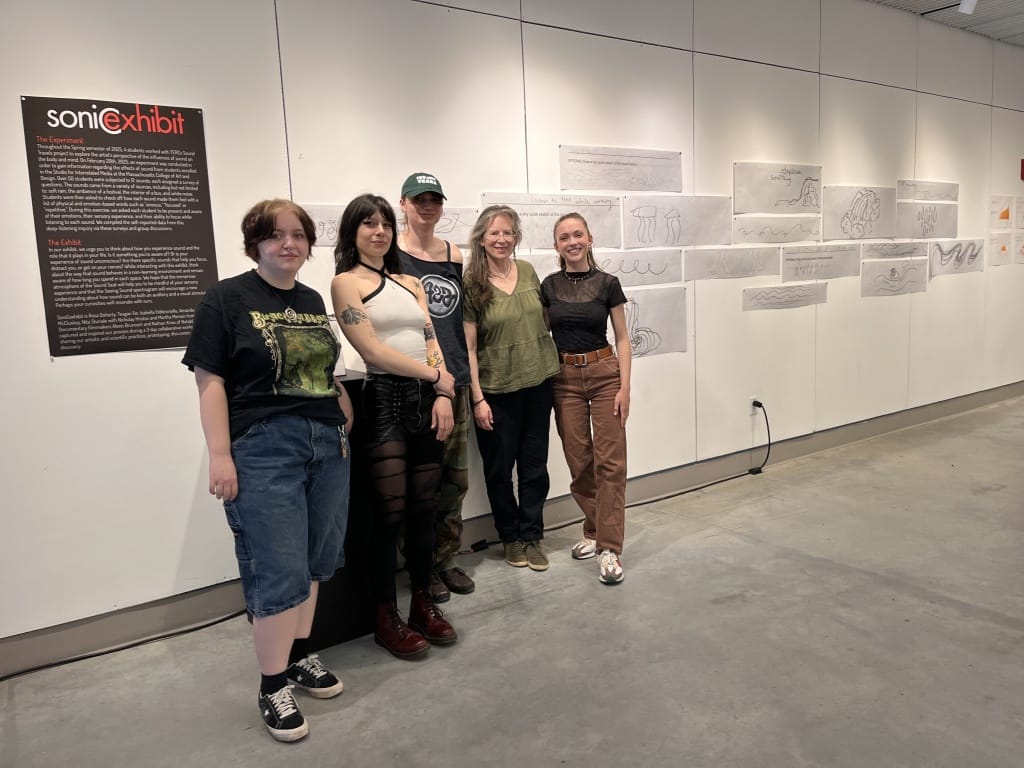
The MassArt x SoWa satellite gallery allows graduate students to display their work publicly while honing their curatorial skills.
Learn MoreAt MassArt, MFA students and alumni uncover their unique curatorial styles through hands-on experiences and courses like Curatorial Practice. Catherine LeComte Lecce’s exhibition, Matrescence, explored the profound and often overlooked transformations of motherhood.

Catherine LeComte Lecce, '23 MFA Photography. Image courtesy of the artist.
Lisa Tung, who curates the exhibitions for MassArt’s on-campus museum MAAM, has been quoted as saying that “Every curator’s process is a little different.” How each curator chooses the works to be included in an exhibition is their “secret sauce,” she says.
But how does one learn what their secret sauce is? How do they develop it? At MassArt there are a couple of different ways.
One is by taking a graduate programs elective called Curatorial Practice (which fills up fast). There, students are introduced to the idea that curators don’t simply choose art. In making their decisions, they are in effect arranging open conversations that are social, cultural, and even political in nature.
The students are exposed to different ways of thinking about the curation process – guest speakers from a variety of arts institutions speak to the class about everything that goes into contemporary exhibition making. The students also gain hands-on experience in all aspects of the art presentation process, collectively planning and executing an exhibition at MassArt x SoWa, MassArt’s off-campus public gallery space in Boston’s art and design district. They learn everything from the initial conceptual framework to the installation and promotion/marketing.
As graduate alumni, they can apply to curate a show of their own at MassArt x SoWa. MassArt sends out an alumni curatorial call twice a year. Catherine LeComte Lecce was one of those alums whose application for curation was accepted. Her show, Matrescence, ran this spring and summer, and we had an opportunity to talk with her about her curatorial process, her own secret sauce.
What is Matrescence, exactly?
Catherine LeComte Lecce: It’s a term coined by anthropologist Dana Raphael in the 1970s to focus on the subject of ‘mother-becoming.’ It’s meant to refer to the profound change in identity that occurs when someone becomes a mother.
Why that subject?
LeComte Lecce: I had my son in August of 2023. When I was pregnant I didn’t expect to make art about motherhood. But the shift to motherhood is so intense and unexplainable, and I wanted to explore that shift through art making.
How did your exhibition examine the shift to motherhood in a way that was different from others?
LeComte Lecce: There actually haven’t been many exhibitions on this topic. Historically, when there have been, art on the theme of motherhood hasn’t tended to be taken seriously. It was sort of seen as a hobby, or ‘That’s cute. You make things about children – how nice.’ I’m hoping that by having curated this exhibition motherhood will be taken as a serious topic that should be shown more.
How did you decide what to include?
LeComte Lecce: I wanted to take viewers on a journey of contemplative moments but also playful moments and very serious, terrifying ones that need to be discussed – especially postpartum themes.
Can you give some examples of the kinds of works you chose?
LeComte Lecce: The works examined such topics as raising children against the backdrop of one’s own mother’s suicide; a new mother who developed preeclampsia a week after giving birth and who could have died had a friend not told her to seek medical care; and the careless remarks of people to a mother who lost her child through miscarriage.
Those certainly are serious issues. How were they articulated artistically?
LeComte Lecce: Well, for instance, a wood-carved sculpture by Alison Croney Moses depicted the tensile stress of an artery looking as though it’s about to burst with the dangerously high blood pressure that characterizes preeclampsia, blood squeezing through the vessel’s walls. The pleasure of motherhood was included, as well. Kara Patrowicz turned wool sourced from local farms into exuberant expressions of childhood happiness and calm. I also curated works examining motherhood through the lens of race and colonialism. And I included a work of my own, a vignette of throw pillows embroidered with remarks commonly made to women grieving in miscarriage – ‘It wasn’t your fault; ‘At least you weren’t further along.’ I found that at least in the type of American culture that I had experienced, people didn’t really know how to talk about death and loss around miscarriage. So there are many different kinds of mother-becoming. My main goal in all of this was to raise more awareness of us artist mothers out there and our multifaceted experiences.
What would you say was the most meaningful aspect of how your MassArt experience prepared you to develop your skills as a curator?
LeComte Lecce: Before I ever submitted an application to curate a show, I worked as a graduate assistant at MassArt x SoWA while I was a student in the MFA program. I learned how to work with other artists, how to communicate, how to reach out. And the gallerists were incredibly supportive. They let the graduate assistants be very hands-on. They let us install, give feedback on exhibitions, meet the artists. So when it came time to apply to be a curator as an alum, I was able to rely on the network I had amassed through my MassArt affiliation and also on the skills I had acquired – it was a bridge to a world of exploring curation I might not otherwise have had access to as a first-time curator. It was an incredible opportunity.

The MassArt x SoWa satellite gallery allows graduate students to display their work publicly while honing their curatorial skills.
Learn MoreMassArt alumna Tracy Silva Barbosa on her journey from New Bedford to becoming a glass artist.
View story
MassArt and TERC bring creative installations together with research on soundscapes and learning.
View story